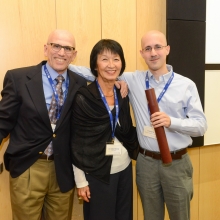Diet for the planet
Sugar-starved bacteria may serve up strategies to fight global warming
Briefs

Kicking the sugar habit is not only good for people, it’s good for the planet. At the Weizmann Institute, scientists have demonstrated that, when weaned off sugar, bacteria can consume carbon dioxide (CO2) instead. Since atmospheric CO2, in high concentrations, increases the greenhouse effect and drives climate change, that’s good news indeed.
The study, directed by Prof. Ron Milo of the Institute’s Department of Plant and Environmental Sciences and co-authored by Dr. Shmuel Gleizer, a postdoctoral researcher in the Milo lab, was recently published in the scientific journal Cell.
The scientists created strains of Escherichia coli bacteria that consume CO2, rather than sugar. This metabolic transformation is more than just a laboratory curiosity; it creates a revolutionary experimental platform that may eventually help the scientific community address fundamental challenges related to sustainable agriculture, the production of “green” biofuels, and the global warming caused by industrial CO2 emissions.
By transforming E. coli —the workhorse of biotechnology—so that it uses only CO2 to synthesize its biomass, Prof. Milo and his team have opened up the possibility of using engineered bacteria to transform waste into ”carbon-neutral” energy sources that absorb atmospheric CO2, reducing our dependence on fossil fuels. The platform may also help plant scientists understand and improve the molecular basis of food production, something that could point toward new strategies for increasing agricultural yields.

Prof. Ron Milo
CO2 “eating machines”
The process of creating bacterial CO2 “eating machines” began with the use of genetic techniques, which allowed the scientists to produce E. coli strains that expressed non-native enzymes, and also had the ability to harvest energy from formate, a readily available substance which can be produced from electricity and air. But this was still not enough, because E. coli's metabolism is naturally programmed to consume organic compounds like sugar, not CO2, which is an inorganic gas.
To wean the bacteria off their traditional organic diet, and accustom them to eating inorganic CO2, Prof. Milo and his team began a process of directed evolution, in which bacterial populations were slowly starved of sugar, and forced to adapt. Ultimately, natural selection worked its magic: those bacterial populations that were most adept at changing their dining habits, absorbing and using CO2 for construction of new offspring, were the populations that survived.
“The study describes, for the first time, a successful transformation of a bacterium’s mode of growth into the mode usually associated with plants, which depends on the absorption of atmospheric CO2 for the creation of biomass,” says Dr. Gleizer. “It was such a long shot that we were, surprised when we succeeded, and were also surprised that such a small number of genetic changes were required to make the transition.”
Prof. Ron Milo is the Head of the Mary and Tom Beck - Canadian Center for Alternative Energy Research. His research is supported by the Zuckerman STEM Leadership Program; the Larson Charitable Foundation New Scientist Fund; the Ullmann Family Foundation; Dana and Yossie Hollander; and the European Research Council. Prof. Milo is the incumbent of the Charles and Louise Gartner Professorial Chair.








